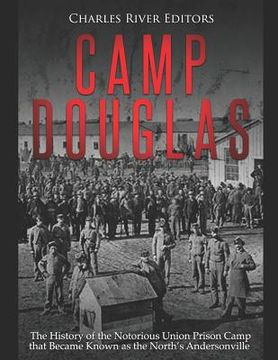Camp Douglas: The History of the Notorious Union Prison Camp that Became Known as the North's Andersonville (in English)
Synopsis "Camp Douglas: The History of the Notorious Union Prison Camp that Became Known as the North's Andersonville (in English)"
*Includes pictures*Includes contemporary accounts*Includes online resources and a bibliography for further reading"Sir, the amount of standing water, unpoliced grounds, of foul sinks, of unventilated and crowded barracks, of general disorder, of soil reeking miasmatic accretions, of rotten bones and emptying of camp kettles, is enough to drive a sanitarian to despair. I hope that no thought will be entertained of mending matters. The absolute abandonment of the spot seems to be the only judicious course. I do not believe that any amount of drainage would purge that soil loaded with accumulated filth or those barracks fetid with two stories of vermin and animal exhalations. Nothing but fire can cleanse them." - Henry Whitney Bellows, president of the U.S. Sanitary Commission, in a report to Lieutenant Colonel William Hoffman, Office of the Commissary-General of Prisoners, about Camp DouglasIt is impossible to conduct a war without atrocities occurring, primarily because war itself is an atrocity, but when those who win the war write the histories, as they almost always do, they typically ignore or seek to explain away their own malevolent acts while exaggerating those of their defeated enemy. This goes a long way in explaining why the name Andersonville immediately conjures up visions of horrific suffering for many Americans, while the name Camp Douglas means almost nothing to those who aren't intimately familiar with the Civil War. When Union forces marched through Georgia and liberated Andersonville in May 1865, photographers were brought in to record the scenes of overcrowding, sickness, and death, ensuring the sight was preserved for future generations to see. Unable to supply its own armies, the Confederates had inadequately supplied the prison and its thousands of Union prisoners, leaving over 25% of the prisoners to die of starvation and disease. All told, Andersonville accounted for 40% of the deaths of all Union prisoners in the South, and the causes of death included malnutrition, disease, poor sanitation, overcrowding, and exposure to inclement weather. In fact, Andersonville infuriated the North so much that Henry Wirz, the man in charge of Andersonville, was the only Confederate executed after the war. Conversely, Camp Douglas, closed at roughly the same time, was torn down, and its very existence was nearly wiped from memory. The attempt to forget Camp Douglas was understandable, because in the last two years of the war, at least 4,000 Confederate prisoners died there, meaning nearly 1 in 5 Confederates who were sent there never left. In many ways, the story of Camp Douglas is the story of the Civil War itself. The camp got its start as a brand new facility filled with men ready to fight a war that most on both sides believed would last only a few months. However, as the war went on, the facilities were overwhelmed by the sheer scale of the damage and the massive numbers of people involved. In the first few years of the war, the kind of total war practiced by Grant and Sherman in 1864 was unthinkable, and the two sides liberally conducted prisoner exchanges and paroled prisoners based solely on their word. As time passed, however, bitterness hardened between the two sides, and the war aims changed as the North looked for new strategies to finally subdue the South. The resulting chain of events led to the horrors of Camp Douglas.Camp Douglas: The History of the Notorious Union Prison Camp that Became Known as the North's Andersonville examines how Camp Douglas earned its awful moniker, and what life was like there for Confederate prisoners. Along with pictures depicting important people, places, and events, you will learn about Camp Douglas like never before.

